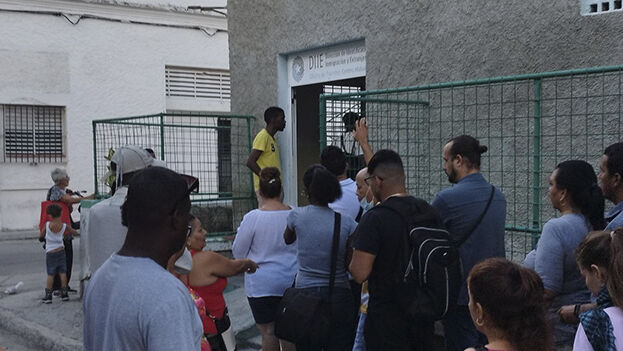
![]() 14ymedio, Madrid, 29 December 2022 — The director of Consular Affairs and Cubans Living Abroad, Ernesto Soberón, reminded Cubans who have been abroad for more than 24 months that the measure adopted in October 2020 by which they do not lose their status as residents of the Island is still in force.
14ymedio, Madrid, 29 December 2022 — The director of Consular Affairs and Cubans Living Abroad, Ernesto Soberón, reminded Cubans who have been abroad for more than 24 months that the measure adopted in October 2020 by which they do not lose their status as residents of the Island is still in force.
The exception to the current 2013 Immigration Law began in October 2020, during the COVID-19 pandemic, so that Cubans who had not been able to return to the Island due to border closures and the cancellation of flights did not see their status modified.
“On New Year’s Eve, it is reiterated to our nationals that the automatic and free extension of uninterrupted stay abroad remains in force beyond 24 months, without implying the loss of resident status in the national territory,” Soberón wrote on his Twitter account.
The extension of the measure, which has always been “until further notice,” has been maintained over time despite the fact that the international and Island landscape has changed as far as the pandemic is concerned. In September 2021, in his reminder of the validity of the exception, Soberón indicated:
“Given the persistence of the complex international epidemiological situation, the extension remains in force until further notice, automatic and at no cost, of uninterrupted stay abroad beyond 24 months, maintaining status as residents in the national territory.”
On this occasion, when the borders of most countries have already opened without many restrictions, there is apparently no reason to maintain the situation. The paralysis could be attributed to the possible change in the Cuban Immigration Law, which according to 14ymedio sources is being prepared for next year.
At the beginning of November, this newspaper published information from an anonymous source linked to the Land Registry which said that a commission is preparing changes to the rule to adapt to the scenario of massive departures that affects the Island and which has pushed notaries and property registrars to the limit.
“We are now in the proposal phase, but the guidance we have received is that it is about adjusting the current legislation so that it contemplates the possibility of making the issue of property and its conservation more flexible in the hands of those who spend some time abroad. We are still in the preliminary phase, although we have been told that everything could be approved very quickly,” he said.
Among the proposals is to allow the same person to own more than one home, but also to relax the status of citizen. “We have to find a solution to all this, and making the 24-month time that the person can stay out of the country without losing their property more flexible is a first step.”
Soberón himself stated on a trip to Uruguay this October that the Government is working on a “Citizenship Law and working on promoting relations with emigrants.”
Meanwhile, this Wednesday, the official added in a second tweet that “the possibility of returning to Cuba is also maintained, exceptionally and for one time, with their passport expired and without being extended, to residents in the national territory who were abroad on March 19, 2020, and have not yet returned to Cuba.”
On the other hand, Soberón still does not explain the reasons that justify the prohibition of at least three young Cuban activists — Anamely Ramos, Omara Ruiz Urquiola and Carlos Manuel Álvarez — from returning to their country. The spokesman for the regime stated that article 24 of the Migration Law* was being “applied.”
On the same day, the Ministry of the Interior wanted to stop the rumors circulating about a rise in passport prices. In a note published in the official press, the immigration authorities ask Cubans “to dismiss any ’unfounded rumor’ that is not published through official means and by the relevant authority.”
The Directorate of Identification, Immigration and Aliens (DIIE) of the Ministry of the Interior reiterates that the channels and formalities established by the Law in this regard are maintained, and no change in cost is expected immediately,” the text adds.
The Cuban passport is one of the most expensive in the world, especially if one takes into account the low mobility it provides, since fewer than 40 countries provide free visas for the citizens of the Island. With a duration of 6 years, the current price of the document for residents of the Island is 2,500 pesos, and two extensions are 500 each, while for emigrants the cost ranges from 200 to more than 400 dollars depending on the country of residence.
*Translator’s note: Article 24.1 says that Cuba “can prevent the entry of anyone who organizes, stimulates, carries out or participates in hostile actions against the political, economic and social foundations of the Cuban State.”
Translated by Regina Anavy
____________
COLLABORATE WITH OUR WORK: The 14ymedio team is committed to practicing serious journalism that reflects Cuba’s reality in all its depth. Thank you for joining us on this long journey. We invite you to continue supporting us by becoming a member of 14ymedio now. Together we can continue transforming journalism in Cuba.
